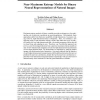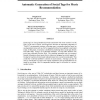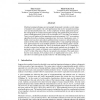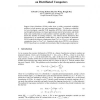96
Voted
NIPS
2007
15 years 2 months ago
2007
This paper considers kernels invariant to translation, rotation and dilation. We show that no non-trivial positive definite (p.d.) kernels exist which are radial and dilation inv...
94
Voted
NIPS
2007
15 years 2 months ago
2007
Maximum entropy analysis of binary variables provides an elegant way for studying the role of pairwise correlations in neural populations. Unfortunately, these approaches suffer f...
115
Voted
NIPS
2007
15 years 2 months ago
2007
Traditional analysis methods for single-trial classification of electroencephalography (EEG) focus on two types of paradigms: phase locked methods, in which the amplitude of the ...
105
click to vote
NIPS
2007
15 years 2 months ago
2007
Social tags are user-generated keywords associated with some resource on the Web. In the case of music, social tags have become an important component of “Web2.0” recommender ...
NIPS
2007
15 years 2 months ago
2007
We consider apprenticeship learning—learning from expert demonstrations—in the setting of large, complex domains. Past work in apprenticeship learning requires that the expert...
NIPS
2007
15 years 2 months ago
2007
Machine learning techniques are increasingly being used to produce a wide-range of classifiers for complex real-world applications that involve nonuniform testing costs and miscl...
106
Voted
NIPS
2007
15 years 2 months ago
2007
We provide provably privacy-preserving versions of belief propagation, Gibbs sampling, and other local algorithms — distributed multiparty protocols in which each party or verte...
NIPS
2007
15 years 2 months ago
2007
A semi-supervised multitask learning (MTL) framework is presented, in which M parameterized semi-supervised classifiers, each associated with one of M partially labeled data mani...
83
Voted
NIPS
2007
15 years 2 months ago
2007
We present a novel boosting algorithm, called SoftBoost, designed for sets of binary labeled examples that are not necessarily separable by convex combinations of base hypotheses....
80
Voted
NIPS
2007
15 years 2 months ago
2007
Support Vector Machines (SVMs) suffer from a widely recognized scalability problem in both memory use and computational time. To improve scalability, we have developed a parallel ...




